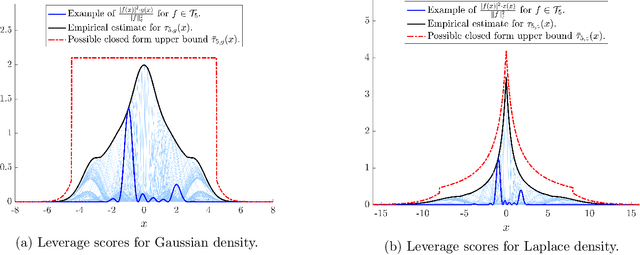Fourier Sparse Leverage Scores and Approximate Kernel Learning
Paper and Code
Jun 12, 2020



We prove new explicit upper bounds on the leverage scores of Fourier sparse functions under both the Gaussian and Laplace measures. In particular, we study $s$-sparse functions of the form $f(x) = \sum_{j=1}^s a_j e^{i \lambda_j x}$ for coefficients $a_j \in \mathbb{C}$ and frequencies $\lambda_j \in \mathbb{R}$. Bounding Fourier sparse leverage scores under various measures is of pure mathematical interest in approximation theory, and our work extends existing results for the uniform measure [Erd17,CP19a]. Practically, our bounds are motivated by two important applications in machine learning: 1. Kernel Approximation. They yield a new random Fourier features algorithm for approximating Gaussian and Cauchy (rational quadratic) kernel matrices. For low-dimensional data, our method uses a near optimal number of features, and its runtime is polynomial in the $statistical\ dimension$ of the approximated kernel matrix. It is the first "oblivious sketching method" with this property for any kernel besides the polynomial kernel, resolving an open question of [AKM+17,AKK+20b]. 2. Active Learning. They can be used as non-uniform sampling distributions for robust active learning when data follows a Gaussian or Laplace distribution. Using the framework of [AKM+19], we provide essentially optimal results for bandlimited and multiband interpolation, and Gaussian process regression. These results generalize existing work that only applies to uniformly distributed data.
 Add to Chrome
Add to Chrome Add to Firefox
Add to Firefox Add to Edge
Add to Edge